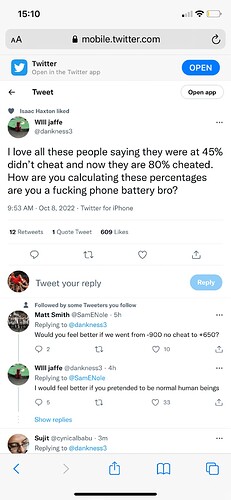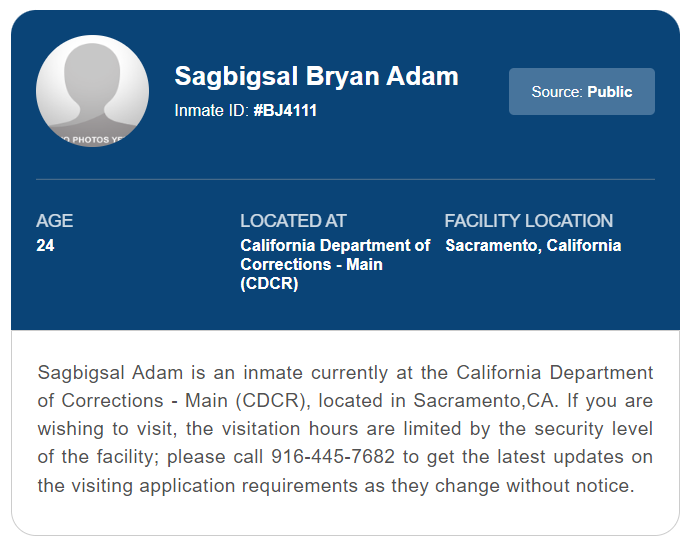It took me 3 seconds to search the same name of the dude in CA they showed to “prove” the arrests and took a screen shot and posted that that person is still locked up.
yea i suspect fishy stuff happens in mine but i still win so i dont really notice, but shit he was talking about i definitely see. the people i play with think they have an edge on me, and certain people always seem to magically seat to my left, but whatever, i have a strategy and study and am winning. he seemed to be aware of the nature of that kind of thing and also didn’t seem to care much, but something else seemed to bother him a lot here. what is bothering him other than what I’m talking about?
To keep a game running you have to get 10+ people, mostly male to be happy sitting at a table together for ~8 hours. While most of them lose money. And we know the personalities of the average poker player. For pros, being around other poker players is maybe the hardest part of the job. If you’re a rich rec…that’s why some games need free booze.
It’s how it I suppose to work.
This is the same exact name of the person with the arrest records in CA which “proves” Bryan from HCL had a criminal record. (I’m not claiming to be an expert at any of this. I did a simple Google search that is all. But the site seems legit? Somebody with more knowledge of this can search the actual CA state prison records and confirm.)
In any case, IF this is actually the guy, then the dumb ass ex cop who runs HCL has some explaining to do about how and why he made a decision to hire this guy for that position. (I’m not saying people with criminal records shouldn’t be hired ever. But that job was probably not a job you would hire a recent convict for.)
What would you consider "hard evidence " in the postle case?
There was analysis done of dozens of sessions and a large sample of hands that showed clear statistical anomalies. That is hard evidence. There was lots of speculative junk in that case too.
I just read Garett’s post and it honestly makes me a little less confident of cheating. He waits a week to make his case, clears it through lawyers, and what he makes is a cut and paste of summary of existing allegations with zero new evidence. Very odd.
This whole week has been such an interesting look into how bad most people are at evaluating and using data to test a hypothesis and build a case. This isn’t their fault. People don’t get training in critical thinking, the methods of science or the philosophy of epidemiology. So much of the analysis this past week has been,
- take fact A
- assume it is true no matter where it came from
- use it as a foundation to build an elaborate series of speculations and suppositions
- treat the final structure as equally valid as the original fact A
This just isn’t how any rules of evidence work yet the average person seems to believe it’s solid reasoning.
We have CW twice posting completely false information itt, it being proved so within 30 minutes then refusing to remove it because it has already become a structural supporting beam in the tower of supposition he was frantically erecting.
The way it is suppose to work is,
- new fact A
- strictly evaluate the source. If source cannot be supported stop evaluation
- if source has been vetted, evaluate the new fact on its own. Test it for it’s own internal logic and robustness.
- now test it against other previously vetted data. Does it work?
- if so, use it to make a further prediction that can be tested with existing or potentially available data.
- never use it to widely speculate on additional unprovable facts not yet vetted through the above process.
I have obviously been hitting the point a lot itt but I really think this whole thing has been a microcosm of why the internet is so bad at evaluating things and why politics has become such a quagmire of false information and conspiracy theories.
TLDR people need training in critical thinking.
The other thing people fail to do in these cases is respect the idea of “innocent until proven guilty”. We have all heard this idea but have we stopped to think about it’s logic.
If we are making a scientific case for something in chemistry, for example, we don’t (or shouldn’t) care if the data being evaluating is accepted or rejected or if the final theory is proven or refuted. We should be totally agnostic of the direction.
This isn’t the case when the thing we are testing is the guilt or innocence of someone because we recognize the complex social factors at play, the difficulty in evaluating them, and the internal biases we all have. We therefore put our fingers on the scale and rightfully begin by putting extra weight on innocent until a very robust and vigorously tested case for guilt can be proven beyond a reasonable doubt.
Too often the internet either fails to put additional weight on innocent, or worse does so on guilty at the very start.
Do we know if someone with access to hole cards is subjected to a criminal background check. One would think this is a good step to add if not.
Well I think we can all agree that the one thing that has been proven this week is that Clovis is the king of analyzing information on Unstuck, clearly he’s the smartest here, and whether he’s right or wrong on this has absolutely no bearing on that because it’s inconceivable that anyone else might be able to parse certain information better than him.
This is such a weird response. You and jwax keep saying I am being pompous for pointing out and wanting to apply the widely accepted rules for evaluating data. Your position is exactly why the right hates experts so much.
I hold us all to higher standard that the average Internet forum because I know we are highly educated and more exposed to evidence. When I hammer this point it’s not some attempt to be a snob. It’s a desire for us to simply be better than the average internet mob.
Of course, many people can evaluate lots of data better than I can. But if they are objectively breaking the rules I can point that out. If that makes me a pompous snob, so be it. This stuff matters so I care about it.
This is gibberish.
There are often complex social factors at play in how someone thinks or wants a scientific experiment to come out. And someone may just as easily have an irrational bias towards thinking someone innocent rather than guilty.
Presumption of innocence does not exist as a technique for getting at the truth of something. It exists because if you are going to take someone’s money, lock them up, kill them, etc, then the burden of proof should be on you and not them. It has nothing to do with people arguing on the internet.
All in all this was a pretty weak post and the youtube links were disorganized and wrong.
It’s both, no? I’ll admit I am not deeply read in the philosophy of law but isn’t presumption of innocence a legal idea that recognizes both the significance of restricting liberty and the difficulty in applying evidence based on human perception (e.g., witnesses)?
My point, although maybe poorly stated, it’s that in the hard sciences there is less of a concern with social factors influencing the outcome (although not zero) compared to the social sciences and something like law. It seems like law is most susceptible to this factor so we begin by weighting on innocent.
Is the implication that witnesses tend to give testimony which errs on the side of incorrectly making people seem more guilty than they actually are? And that if we found evidence that the bias actually went the other way, then we could consider improving our justice system by instead treating people as if they are guilty until proven innocent? Seems weird.
That’s why I talked about directionality. In something like chemistry we are not suppose to care about which direction the evidence points. In something like law we know there are tons of biases that can favour directionality. Of course, as you rightfully point out, it can do so in either direction so we have to be extra cautious. My understanding is the presumption of innocence is partly a response to this idea because we don’t want to remove someone’s liberty because we made an error in applying evidence.
Another factor here (which I didn’t raise because it’s not relevant in the cheating case) is we are also trying to protect the citizen from the power of the state.
Yes and arguing on the internet is not removing someone’s liberty.
Is there a reason the same rules shouldn’t apply? Especially when we have countless examples of suicides and other really bad outcomes generated from the internet mob.
We are arguing on the internet about real people, some with direct connections to people doing the arguing.
If we were arguing over which Star Wars movie is best I wouldn’t care (for the record, they all suck). 
You refuse to accept that others with more experience in live poker, more experience in private games with erratic play, and more skill at exploitative NLHE might be better at evaluating some of the info in this case, and thus capable of drawing very different conclusions.
The J4 hand, her behavior around it, differences in her behavior in different spots (mostly timing), and the fact that 95% of her play fits a certain player profile with 2-4 hands being WILDLY incoherent with that player profile and one of those hands also being the most suspicious TV/stream hand ever adds up tremendously.
The other thing is that you brought up Postle and the sample size, and if you extrapolate that out to requiring a significant sample size before accusing someone no matter how crazy the hand is and/or before taking protective action against the accused, you create the unwanted side effect of letting the cheater get away with way more money.
Remember, Postle didn’t go to jail or give the money back. In the eyes of the law, he’s innocent. But there’s no way that dude is getting on a live stream now.

